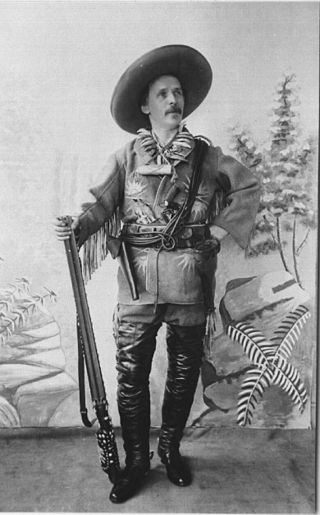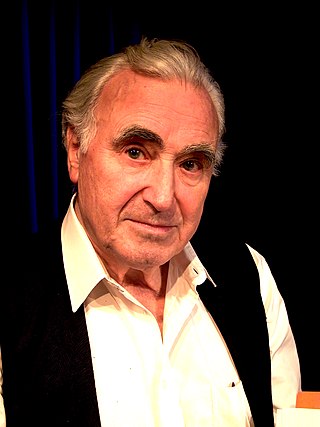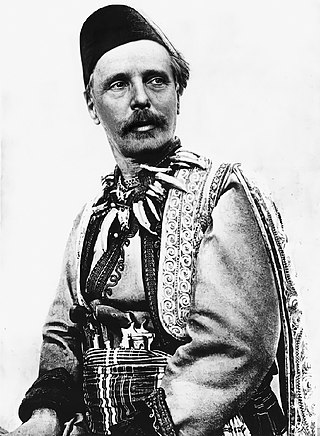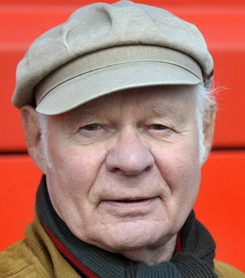
Karl Friedrich May was a German author. He is best known for his novels of travels and adventures, set in the American Old West, the Orient, the Middle East, Latin America, China and Germany. He also wrote poetry, a play, and composed music. He was a proficient player of several musical instruments. Many of his works were adapted for film, theatre, audio dramas and comics. Later in his career, May turned to philosophical and spiritual genres. He is one of the best-selling German writers of all time, with about 200,000,000 copies sold worldwide.

Winnetou is a fictional Native American hero of several novels written in German by Karl May (1842–1912), one of the best-selling German writers of all time with about 200 million copies worldwide, including the Winnetou trilogy. The character made his debut in the novel Old Firehand (1875).

Old Shatterhand is a fictional character in Western novels by German writer Karl May (1842–1912). He is the German friend and blood brother of Winnetou, the fictional chief of the Mescalero tribe of the Apache. He is the main character in the Eurowestern by the same name from 1964, starring Lex Barker, as well as in six more films of the Winnetou film series.
Karl May film adaptations are films based on stories and characters by German author Karl May (1842–1912). The characters Old Shatterhand, Winnetou, and Kara Ben Nemsi are very famous in Central Europe.

Karl Michael Vogler was a German actor, probably best known for his appearances in several big-budget English language films. In The Blue Max (1966), he co-starred with George Peppard and Ursula Andress as the squadron commander, and in Patton (1970), he portrayed General Erwin Rommel. In between, he was in Robert Redford's Downhill Racer (1969) as a ski company owner.

Kara Ben Nemsi is a fictional main character from the works of Karl May, best-selling 19th century German author. An alter ego of May, the stories about Nemsi are written as first-person narratives. He travels across North Africa, Sudan, and the Ottoman Empire including various parts of the Middle East and the Balkans with his friend and servant Hadschi Halef Omar.

Marah Durimeh is a fictional character from Karl May's novels around Kara Ben Nemsi. Her real identity is Ruh'i Kulyan. She is known as Es Sahira to Kurds. Durimeh is a Kurdish princess and widow of a famous king. She is said to have written several books.
Heinz Schubert was a German actor, drama teacher and photographer, best known for playing the role of Alfred Tetzlaff in the German television sitcom Ein Herz und eine Seele.

Carl de Vogt was a German film actor who starred in four of Fritz Lang's early films. He attended the acting school in Cologne, Germany. Together with acting he was also active as a singer and recorded several discs. His greatest hit was "Der Fremdenlegionär". An extremely successful actor in his early career, he died in relative obscurity in 1970.
Johannes Adolf von Kries was a German physiological psychologist who formulated the modern “duplicity” or “duplexity” theory of vision mediated by rod cells at low light levels and three types of cone cells at higher light levels. He made important contributions in the field of haemodynamics. In addition, von Kries was a significant theorist of the foundations of probability.

Wilhelm Bölsche was a German author, editor and publicist. He was among the early promoters of nature conservation and committed to popularizing science.
On the Brink of Paradise is a 1920 German 90-minute film directed by Josef Stein and featuring Carl de Vogt in the title role of Kara Ben Nemsi. Béla Lugosi was thought to have appeared in a supporting uncredited role, but this is disputed.
Meinhart Maur was a Hungarian-German film actor. He appeared in more than 40 films between 1919 and 1954. He was born in Hajdúnánás into a Jewish family. He fled Nazi Germany in 1936 and settled in London, where he died in 1964.
Caravan of Death is a 1920 silent German film directed by Josef Stein and featuring Carl de Vogt as Kara Ben Nemsi. The film was an adaptation of the latter half of the Karl May novel From Baghdad to Stamboul, and is now considered to be lost.
Max Hirsch was a German political economist and politician.
Kara Ben Nemsi Effendi is a German television series broadcast from 1973 through 1975 in 26 parts and two seasons. It featured an adventurer probably inspired by British explorers Richard Francis Burton (1821–1890) and T. E. Lawrence. The scripts were faithful to Karl May's Orient novels, and the score is from Martin Böttcher who previously had composed the music for ten very successful Karl May films in cinema, and also for the two parts of Winnetous Rückkehr in 1998, also being aired by the German station ZDF.
Mit Karl May im Orient is a six-part West German television series based on the Orient cycle of adventure novels by Karl May.

Ralf Wolter was a German stage and screen actor. Wolter appeared in nearly 220 films and television series in his over 60 years as a character actor.

Across the Desert is a 1936 German adventure film directed by Johann Alexander Hübler-Kahla and starring Fred Raupach, Heinz Evelt and Aruth Wartan. It was based on a novel by Karl May. It was the first sound adaptation of a May novel, and the only one to be produced during the Nazi era. Set in the Ottoman Empire during the nineteenth century, it portrays a series of oriental adventures of travellers Kara Ben Nemsi and Hadschi Halef Omar.

The Shoot is a 1964 adventure film directed by Robert Siodmak and starring Lex Barker, Marie Versini and Ralf Wolter. It was made as a co-production between West Germany, France, Italy and Yugoslavia. It is based on the 1892 novel of the same title by Karl May, and was part of a string of adaptations of his work started by Rialto Film's series of western films. It was a commercial success, benefiting from the presence of Barker and Versini who were stars of Rialto's series.










